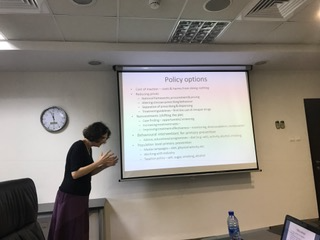Prof Jo Lord and Dr Kalipso Chalikidou visit Ghana to continue work on optimising hypertension care pathway
The Global Health and Development group at Imperial College London (formerly NICE International) has worked with the Ghanaian authorities, under the leadership of the country’s Ministry of Health for a number of years, with support from the UK’s Department for International Development and more recently the Rockefeller Foundation and PATH under ADP. Since the last visit in April 2016 at which a model using cost-effectiveness analysis for hypertensive drugs was developed, the UK team has been working with the Ghanaian partners and PATH to finalise the model, identify opportunities for application of a more streamlined Health Technology Assessment approach to the policy challenges faced by the country, including maximising the heath gains from the current resources through better commissioning (purchasing) of commodities and services, and to the selection of new technologies for investment and currently covered ones for optimisation and disinvestment so resources are reinvested to maximise health and access to those in need. With the HITA Resolution of the WHA 2014, HTA gained momentum as a policy tool (see for example the discussion in the WHO Bulletin and an example from SEARO).
At the end of March 2017, Professor Jo Lord, Director of the Southampton Health Technology Assessments Centre (SHTAC), University of Southampton, and Dr Kalipso Chalkidou travelled to Accra, Ghana to meet with colleagues and follow up on latest developments. iDSI is co-producing with our Ghanaian partners a full report on the technical and data aspects of the model, discussing the likely characteristics of a Ghana-specific Reference Case for economic evaluation and setting out specific policy angles of interest to Ghanaian policy makers, including the potential linkage between HTA and reimbursement. We aim to set out a vision for joint working over the next 2-3 years, based on the country’s priorities and commitment to building the needed capacities for effectively using economic and clinical evidence of comparative effectiveness to inform spending decisions. The report will offer robust estimates of savings from shifts in current practice, from changes in prescribing behaviour to reductions in prices and population level prevention and screening initiatives, to inform Ghanaian policy makers about resources that can be released to expand the breadth and depth of coverage, without harming quality. We hope to do more such analyses on NCDs, including diabetes and end stage kidney disease as well as mental health, as we continue our joint efforts.
At a time where Ghana is transitioning away from aid whilst striving to expand and ensure the financial sustainability of its health insurance scheme, transparency and accountability when it comes to important investment decisions, become even more important. Building on strong institutional structures for multi-stakeholder engagement and evidence informed policy such as the Essential Medicines List and the Standard Treatment Guidelines and the recently formed HTA Working Group, and on existing academic groups with a track record in the field of HTA at Kumasi (KNUST) and Accra (School of Public Health) this is an opportunity to help build a Ghanaian HTA system better to control escalating costs and inform future investment and disinvestment decisions.

A case for further investment in health cannot be made unless systems are in place to ensure good value for money for every Cedi spent. Identifying, in an evidence informed way, opportunities for releasing resources for reinvestment to expand coverage whilst ensuring health outcomes remain the same or improve, is a powerful argument for more and better spending in health. Our report will go some way towards making the case for an HTA mechanism for strengthening the handle of the Ghanaian authorities over its own budget through tackling a specific cased of high spending and high burden, namely hypertension management. Using Ghanaian data and making all assumptions explicit, the analysis will point to areas for improved spending, quantifies potential savings and health gains from reallocation and make a case for an institutionalised approach to HTA in Ghana, as an important tool for transitioning away from aid and towards sustainable and affordable Universal Healthcare Coverage.
Health Technology Assessment offers a framework for decision making though multi-stakeholder processes and a multidisciplinary approach which aims to incorporate evidence and values, locally relevant, to drive better decisions. But it relies heavily on implementation levers such as provider payment, contracting, patient and professional education and strong regulation to make a difference.
